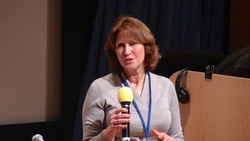 | | Poverty of the Heart | | Speaking at the UN Ingrid Stellmacher explores 'Poverty of the Heart' and launches the Dignity Diaries, as a tool to discover what dignity in toay's world really means.
More ...
|
 | | World Heart Day | | On World Heart Day Ingrid writes about the other heart that's just as important for our survival and the need to recognise it.
More ...
|
 | | Ingrid's Insights | | Le Menach Foundation CEO, Ingrid Stellmacher, unravels complex issues and gets to the heart of conflict resolution issues.
More ...
|
| | |
|
In our right minds?
57th Commission on The Status of Women

'In our right minds', was the perfect title for a session at this year’s United Nations Commission on the Status of Women in New York. Not because it’s the name of Dale Allen’s one woman show, the main speaker at our event, but because who in their right minds, of all the delegates, NGO’s and agencies attending one of the largest international forums in the world, could possibly think that we can actually ‘prevent’, never mind ‘eliminate, violence against women and girls in our lifetime? The title theme of this year’s 57th meeting of the Commission?
I had the privilege of being the opening speaker at the session, sponsored by Montage Initiative; a US based organisation working to create sustainable livelihoods for women in India. The participants purposefully reflected not only a range of expertise and experience but also the rarity of wisdom and youth as well as generation and gender; constituencies that must work together to help counter violence against women and girls.
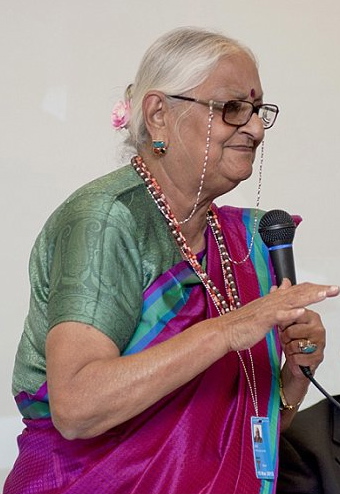 |
Dr Mohini Giri - Head of Guild for Service, India. Photo by 'ar'
|
The wisdom manifested itself in the form of 78 year-old veteran activist and scholar, Dr Mohini Giri, former daughter-in-law of President V Giri of India, and Head of India’s Guild for Service. Dr Giri, who saw first hand the affects of widowhood in India when her own father died, and who was later herself widowed, helped found the Guild in 1972 and works tirelessly to improve the lives of widows in her country. Numbering a staggering 42 million, many of them barely surviving and living on the streets, widows find themselves betrayed by a culture commonly lacking in compassion for its women, in a country beset by corruption that is flagrantly active at all levels of society and governance.
Dr Giri’s tiny bespectacled frame belies her huge passion and commitment, undiminished with age, that bubbles just beneath the surface. Her opening words, that ‘patriarchy breeds poverty’, were received with nods of agreement from an equally distinguished audience and her sense of urgency for action only increased with the announcement that she had just delivered a declaration to the UN, requesting the rights of widows be formally recognised as a United Nations Mandate.
Violence against women and girls has for so long been firmly framed as a ‘woman’s issue’; a messy subject like menstruation; a taboo that no one wants to talk about, with some cultures in silent collusion more than others. But the thing about women’s issues is that they are for the most part, more about men than they are about women. Particularly in cultures where men have absolute power over women and corrupted that partnership absolutely in many cases, disastrously holding those cultures back socially, emotionally and economically. Even in the case of FGM, where it is mostly women themselves perpetrating and perpetuating the practice, it is with men in mind, marriage, and the need to be identifiable as a virgin, that young girls continue to be subjected to this ritual. Who will want them otherwise?
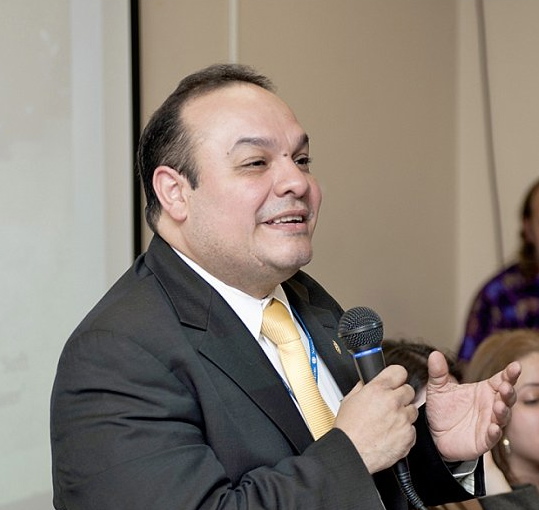 |
UN Per Carlos Garcia-Gonzales, El Savlador. Photo by 'ar'
|
Which is why it was essential to have a male voice on our panel to provide that additional perspective to the discussion. That voice was the UN permanent representative to El Salvador, Ambassador Carlos Enrique Gonzales-Garcia, and this year’s Vice President of the Commission. For how can we talk seriously about ‘women’s issues’ without including men?
The lack of men on other panels in some of the sessions I personally attended was disappointing. In an early one on eliminating violence, where increasing political accountability and addressing structural violence was high on the agenda, not a single man was on the panel comprising senior UN agency heads and government ministers from around the world. As heartening as it is to see women heading these organisations and holding ministerial posts, when the obvious absence of men on the panel was raised during question time by a young man working for the UN himself, the response from the chair was decidedly brief and vague, as if wrong-footed by a question that was totally unexpected.
Self deprecating and with equal amounts of humility and humour, Ambassador Garcia animatedly spoke about the need for accountability, calling for an end to impunity in cases of violence against women and the need to work together. Not just top down, through political policy, or bottom up through social movements but sideways as well. Integrating and collaborating with one another, with organisations dovetailing to create a whole approach to issues as never before. Not just soft power in action but the judicious use of smart power in pulling it all together.
Garcia is a huge advocate of El Salvador’s ‘City of Women’ Initiative - Cuidad Majure in Spanish, supported by the country’s first lady, Vanda Pignato, who is also the Secretary for Social Inclusion. It is more than the usual one-stop social shop for women providing refuge from violence, however. City of Women will provide childcare, police support, help and education on legal and civil rights, job training and a raft of other meaningful integrated services.
The plan is also to provide entrepreneurship opportunity as never before, creating confidence as well as competence. Crucial components for what could create a huge cultural shift regarding women if this initiative’s success equals its ambition. And with these centres set strategically around the country, connecting holistically with one another, not only will whole communities benefit from such collaboration, but the whole country as they form a new social, emotional and economic infrastructure driven by women. This is not just an initiative with guts but one with heart and a model to be applauded, adapted and adopted around the world.
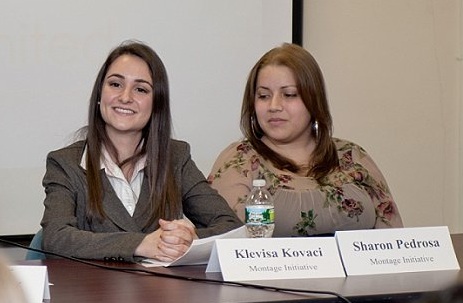 |
Klevisa Kovaci & Sharon Pedrosa, Chair & Co
Founders, Student Advisory Board, Montage Initiative. Photo by 'ar'
|
And finally at the other end of the generation scale, the youth and enthusiasm on the panel came from the Co-Chair and founders of Montage Initiative’s Student Advisory Board, Klevisa Kovaci and Sharon Pedrosa. These young stars from Fairfield University are no longer leaders in the making for they have already demonstrated they are leaders and role models, working for the empowerment of young women not simply as a cause to champion but as a way to convert energy and ideas into action.
With polished professionalism Klevisa and Sharon spoke about creating a ripple affect of change through the board they had founded and model they created for youth empowerment. They outlined the need for other organisations to be more aware of how educational opportunities in Service Learning can reap real dividends for both parties if viewed as an investment and how they themselves had benefited from Montage’s student programme.
Given meaningful mentorship and responsibility, rather than filing and making tea, these young women had become not only mentors themselves to their peers but real decision makers in their own right. Along with several other Montage student colleagues, they had organised and co-ordinated most of the UN event themselves and even the camera crew filming the session were students from another university. Showing just what young men and women can do given the opportunity to collaborate and shine.
As Sharon put it, “Only a year ago we visited the UN during the Commission on the Status of Women for the first time with Montage and now look at us; we’re actually speaking here! And if we can do it, anyone can do it”.
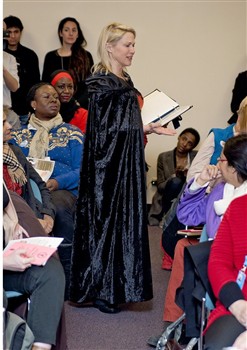 |
Dale Allen - Photo by 'ar'
|
Last in the line up came Dale Allen. Reading with authority as she stepped slowly through the room, her entry was theatrical. Wearing a full-length black cape she read from a large book, quote after quote, of different religious text from around the world that collectively demonised and denigrated women throughout history. The largely unsuspecting audience were spellbound by her delivery as much as stunned to hear women officially declared not only worthless but also evil across the continents, through the ages and in every holy book.
Travelling quickly but seamlessly through time, Dale recounted how women of early cultures were honoured as goddesses, protectors and co-creators. How their fall from grace began slowly with the advent of the alphabet, writing and reading. The different way in which the brain needed to process this new form of information was also the beginning of its rewiring and the great switch over; like going from analogue to digital. From previously, image orientated right brain soft skills of creativity, empathy and intuition associated with feminine qualities, to left brain, hard analytical skills of logic, reasoning and linear thinking; traditionally attributed to male ways of seeing and being in the world.
Leonard Shlain, put forward the hypothesis of the alphabet as the ancient female nemesis, in his book the ‘Alphabet versus the Goddess’ published in 2004, in what he describes as the 'conflict of word over image'. As a consequence the written word became the God of all things; over symbols, sex and of course women. Dominating a world where feminine attributes had previously held the greater currency.
But technology and the keyboard is our saviour apparently and its widespread use in our offices, our homes and on the move, by both sexes, is activating left and right brain connectivity in a new simultaneous conversation as never before. Rewiring new areas of our brain and encouraging not only new pathways of connectivity but greater access to creativity and enabling men in particular, to see the world through new eyes. If the left brain/right brain theory holds validity then announcements from the scientific community last year that the human race had reached its evolutionary limit, as there is no space left inside our skulls for our brain to grow larger, then perhaps our brain rewiring itself is where the real action and evolution is; the sum being greater than its parts.
'The human race has reached its evolutionary limit'
The human race is now exposed to more information in a single day than our 15th century ancestors were exposed to in an entire year. But while the proliferation of ‘experts’ online makes more information available to the masses it does not necessarily make us wiser as a result. Information is simply knowledge. The wisdom lies in how you apply it. If Shlain’s theory is to be believed, not only is the use of our keyboards helping to balance out our brain but being bombarded by images through our TV’s, PC’s and hand held devices 24 hours a day maybe another contributing factor. Images being processed in the right, more ‘feminine’ part of our brain.
Dale ended her contribution with a heartfelt song about the long and lonely wait for the return of the soul; the archetype that is woman and the feminine, to an eruption of emotion and applause. Joanne Watkins, my close friend, colleague and CEO of Montage Initiative, had achieved what she set out to do; deliver a session on empowering women using different ways of engaging; through words, images and theatre and one that will be remembered for the unique why in which stories were told and issues were touched.
Memorable as it is however, in the time it has taken you to read this, somewhere in the world a woman has been raped, a child abused, and a life will have been broken forever. Against the backdrop of the cavernous collective wound of daily violence against women, that mankind continues to inflict on itself, what difference do all the statements, sharing and networking at a meeting of this magnitude make?
What can we take away from our own session and this year's Commission as a whole? What was clear, is that language and meaning is a key factor in both the sharing of best practice and its delivery. The shameful failure to agree acceptable conclusions at the end of last year's Commission was due to differences of language and terminology in the final draft document, which contained so many strike throughs and deletions it was rendered virtually incomprehensible. A repeat of a similar roadblock has thankfully been avoided this year.
'We want more mentors and less monsters'
Now more than ever we need smart, collaborative, strategic thinking and action if we are to succeed and making use of technology and big data in creative ways. Both as organisations, and in the use of our tools, approaches and resources from every possible avenue. Conventional and crazy; top down, bottom up and sideways. From left of field and right to the heart; from social media to individual effort leading to widespread co-operation at scale. Culture change comes through a number of different influences; including education, communication and imagination. Their effects converging in the mother of all tipping points when the 'hundredth monkey has joined the 99' and the timing is ripe for change. Most of all change comes when people have had enough. It is crucial for men to be involved in the culturally sensitive conversations needed at every level along with the concrete commitment at the top that is sadly lacking right now. We need more men to stand up and stand by us, as role models as well as change agents. We want more mentors and less monsters.
While introducing an additional perspective of difference between the sexes that could supposedly change mankind for the better if united, does pose an interesting hypothesis, the real meaning behind Dale's story is to help women understand and maybe even remember, that once upon a time it was different and that they must hold on to the hope that one day it will be again. This is what keeps us striving towards our common goals on the long road towards fighting violence against women and girls. We know that culture change is a long and complex process and that working together we can make a difference. The belief in that is part of why we have come. Not to just to share and learn together but to renew our hope together. For without that, our task surely feels insurmountable and we will have lost everything.
Poetically, ho pe comes in many forms. The ancient Greeks had a Goddess of Hope named Elpis, who alone stayed on earth to comfort mankind after all other spirits had fled. That the ancient Greeks made the quality of hope itself feminine is perhaps even more relevant in the present. pe comes in many forms. The ancient Greeks had a Goddess of Hope named Elpis, who alone stayed on earth to comfort mankind after all other spirits had fled. That the ancient Greeks made the quality of hope itself feminine is perhaps even more relevant in the present.
The Greeks had another Goddess named Nemesis. She is the Goddess of Retribution whose job it was to restore balance to the world. In order to do so, however, she had first to destroy it to pave the way for its rebirth. If we can't stop the worldwide epidemic of violence against women and girls soon, the perpetrators might beat Nemesis to it.
Elpis - Greek Goddess of Hope
|
Ingrid Stellmacher, 08/03/2013
|
|
|
| |